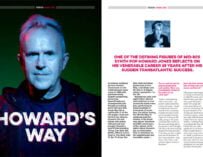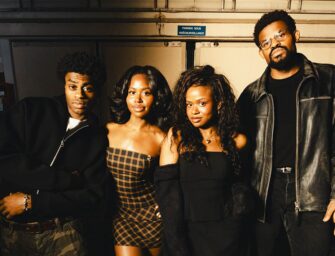
Pic: Sam Hiscox
We meet a young Australian songwriter who’s out to show that great pop and intelligent lyrics needn’t be mutually exclusive
![]() ere at Songwriting, we listen to a lot of new music. Every single day, CDs arrive in the post and countless promotional emails from record companies land in the inbox… and that’s not forgetting the 700 or so demos from unsigned artists we listen to every month while picking a winner for our competition with ReverbNation. It’s a dirty job, etc.
ere at Songwriting, we listen to a lot of new music. Every single day, CDs arrive in the post and countless promotional emails from record companies land in the inbox… and that’s not forgetting the 700 or so demos from unsigned artists we listen to every month while picking a winner for our competition with ReverbNation. It’s a dirty job, etc.
As you can imagine, a lot of that music tends to fall into certain categories. Aspiring US country starlets hoping to following in Taylor Swift’s foosteps? Earnest young men with acoustic guitars convinced they’ll be the next Ed Sheeran? We can point you in the direction of hundreds of those. Some of them are even quite good, as it goes. Glossy pop with instantly accessible hooks, high production values and the most anodyne, bland, clichéd lyrics ever to disgrace a notebook? We get sent plenty of that, too.
But pop music that’s actually got decent lyrics? That, dear reader, is a rare commodity indeed. Which why when we heard The Hustler , the second self-released single by Josef Salvat, we knew that this was a young man who had to feature on Songwriting. A bittersweet concoction that recalls the more intelligent side of 80s synth-pop, The Hustler stood out like a small, glowing pearl of creativity in a sea of identikit dross.
So we picked up the phone…
You’re from Australia, but based in the UK. What made you decide to move here?
“Music, really… this is where the sound I wanted to make was coming from. How would I describe that sound? Well, I don’t think I’ve perfected it yet, that’s for sure. It’s still in a state of development, I’d say, and all my songs are quite different, really. Both of the two singles have been quite downbeat and moody and dramatic, but not all of my music is like that by any means.”
We were struck by the resemblance of The Hustler to 80s bands like The Associates, Furniture or Black. But you weren’t even alive when they were in the charts, were you?
“No, but I grew up with my parents listening to a lot of 80s music, so I was definitely influenced by… well, not those bands in particular but people like Sade, Art Of Noise and Depeche Mode. I wouldn’t say they were my biggest influence but it’s definitely in there somewhere, sort of incidentally. I think what I like is a mixture of raw acoustic sounds with synthesizers and lots of reverb, and that’s what you got on a lot of those 80s records, too.”
“I wrote my first song when I was about 13, about my grandmother dying”
Tell us a little bit about your own musical background
“Well, we always had a piano in the house, so I grew up playing piano, even though I’ve never had any formal training. Until I was nine or ten it was mostly classical music, ballet and opera. Bizet, I was really into… and then a lot of the mid-20th century experimental, atonal stuff. But my parents would listen to stuff like Art Of Noise and Bruce Springsteen, and Billie Holliday.
“And then I guess I wrote my first song when I was about 13 or so. It was called Eulogy, and it was about my grandmother dying. And it was pretty good, actually… at least, it was good enough for me to think, ‘I can do this!’ and carry on writing. Unfortunately, a lot of shit came after that!”
What can you tell us about your songwriting technique now?
“I still prefer to write on the piano, but for a couple of years before coming to England I was living in Barcelona and didn’t have access to a piano. So during that time I’d do all my writing on a PC using Logic. I found that frustrating at first, but you get used to it… so now it’s usually a mix of the two, the piano and the computer.
“Usually it’s the verse chords that come first, then that informs the melody and the lyric. Then I’ll go back and write the rest of the chords. Lately, though, the lyrics have started to come earlier. It used to be I’d write the music first, then the words, but recently it’s more kind of integrated.”

Pic: Louie Banks
Speaking of lyrics… the words to The Hustler are quite dark, aren’t they? Are we right in thinking the song’s about a rent boy?
“Not really… well, it could be about a rent boy, yeah, but it’s really about anyone who’s got depressive tendencies, or slightly masochistic tendencies. It seems if your mind tends to work that way then you’re always drawn to something destructive, whether it’s drink, or drugs, or unhealthy sex. So really it’s about behaviour that’s unhealthy for your head… which I guess being a rent boy would be, I mean, I’ve never been one! [laughs] But the hustler, as in the title, is really just an opportunistic character.”
And yet those dark lyrics are juxtaposed with quite sweet, poppy melodies…
“Yeah, that’s kinda deliberate. No matter how much I wallow in those darker headspaces, I try and counter it. I enjoy a bittersweet sound, so the music might sound happy but the lyrics are darker. I guess the idea is to make music that’s easy and pleasant to listen to but without having to sacrifice intelligent lyrical content.”
Is that viable in today’s pop market, do you think?
“I think so… I hope so! Okay yes, you get a lot of records where it’s great pop but with really rubbish lyrics, but then equally, look at someone like Frank Ocean – he’s definitely an exception to that rule. So yeah, I think it can work, it’s just perhaps not as easy to churn out formulaic ‘successful songs’. But I think if people are offered it and hear it, then they enjoy it and they take it up.”
So is pop stardom the dream for Josef Salvat? What if you were offered the fame and the fortune, but only if you sang nothing but happy-go-lucky ditties forever?
“Well, I do have songs that are about how the sun is shining and it’s a beautiful day, they just haven’t come out yet! But no, I know what you mean and I think I’d have to walk away in that case. I’m not really after stardom as such, but I would like to make a living from my songwriting and performing, just because it’s something I’ve always done and something that I enjoy doing.
“I do try and write songs that appeal to people”
“And sure, of course I’d like other people to enjoy my music, too… but not if it meant just writing typical formulaic full-on pop songs for the rest of my life, no. That said, I do consciously try and write songs that appeal to people.”
Do you have any tips in that respect – or any songwriting tips generally – that you’d like to share?
“One thing I found quite helpful was, a few years ago, I set myself the task where I had to write a song a week, kind of as an exercise in discipline. If truth be told, I wasn’t entirely successful, I didn’t quite manage one a week… but it did mean I had to keep thinking of song ideas, whether musically or lyrically.
“And then once you do that long enough it kind of becomes habit, and I’d say I definitely find songwriting a little easier now, after that exercise. It’s like, the machine is a bit better oiled now!”
Okay, some quick-fire questions to end on. If you could have written any song, what would it be?
“Rolling In The Deep by Adele… for financial reasons but also because I think it’s just one of the most genius songs ever written.”
If you could co-write with anyone, alive or dead, who would it be?
“Dead, I’d say Jacques Brel, just to try and learn how he manages to get so much emotion into his music. And alive, well Adele is fantastic… but I think I’d have to say Prince or David Bowie.”
And finally, what one thing would you like Songwriting readers to know about you?
“Just that… I think there’s a risk if you listen to my songs that I must wander round in a state of melancholy all the time. But I’m not actually like that at all… it’s like the songs are my catharsis, my downtime, and it all comes out there. I’m quite a happy person, really.”
Interview: Russell Deeks
Josef Salvat’s current single The Hustler and previous EP This Life are available on iTunes now


































Related Articles